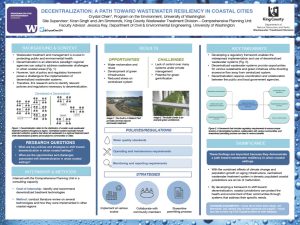Decentralization: A Path Toward Wastewater Resiliency in Coastal Cities
Centralized wastewater treatment systems have historically been crucial in protecting public and environmental health in urban areas. However, with the compounding effects of climate change and growing population on aging infrastructure, decentralization has become a viable strategy to address current and foreseeable wastewater treatment challenges. Decentralization refers to the distribution of smaller scale treatment systems throughout a region. One of the main reasons the installation of decentralized system has been considered in coastal jurisdictions is due to its ability to divert excessive inflow away from stressed regional systems. I interned with the King County Wastewater Treatment Division and was tasked with researching decentralization strategies other coastal jurisdictions have implemented for the Comprehensive Planning Unit. Through my literature review of several coastal jurisdictions, I found that policies and strategies to ensure successful implementation include establishing water quality standards for on-site treatment, streamlining the permitting process for installation of decentralized systems, and coordinating with local jurisdictions and communities. In addition to reducing stress on regional systems, these strategies enable opportunities to implement green infrastructure and sustainable water practices. Although full decentralization is unlikely in context to urban settings, the distribution of supplemental treatment systems throughout a growing region protects the health of both human and natural ecosystems in the face of climate change.
